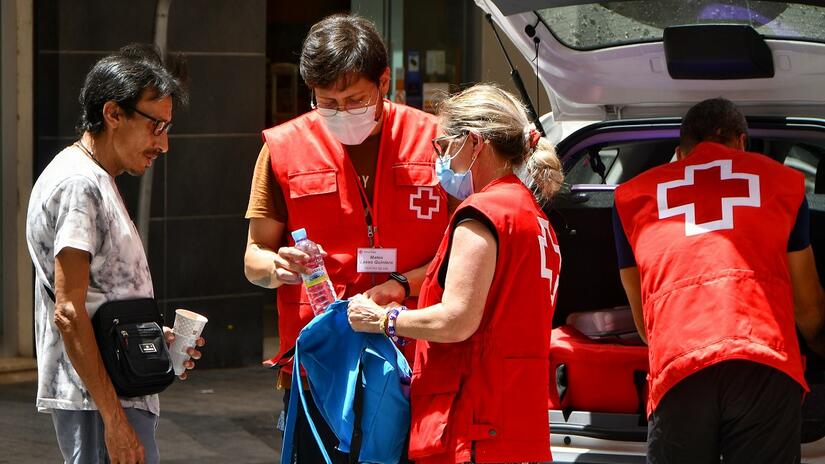Human-caused climate change made the record-breaking heatwave in Spain, Portugal, Morocco and Algeria at least 100 times more likely and the heat would have been almost impossible without climate change, according to rapid attribution analysis by an international team of leading climate scientists as part of the World Weather Attribution group.
In late April, parts of southwestern Europe and North Africa experienced a massive heatwave that brought extremely high temperatures never previously recorded in the region at this time of the year, with temperatures reaching 36.9-41°C in the four countries. The event broke temperature records by a large margin, against the backdrop of an intense drought.
Across the world, climate change has made heatwaves more common, longer and hotter. To quantify the effect of climate change on these high temperatures, scientists analysed weather data and computer model simulations to compare the climate as it is today, after about 1.2°C of global warming since the late 1800s, with the climate of the past, following peer-reviewed methods. The analysis looked at the average of the maximum temperature for three consecutive days in April across southern Spain and Portugal, most of Morocco and the northwest part of Algeria.
The researchers found that climate change made the heatwave at least 100 times more likely, with temperatures up to 3.5°C hotter than they would have been without climate change. They calculated that the event is still unusual, even with the large increase in likelihood due to human-caused warming, indicating it would have been almost impossible without climate change.
As other analyses of extreme heat in Europe have found, extreme temperatures are increasing faster in the region than climate models have predicted, a question that is currently under intense research. Until overall greenhouse gas emissions are halted, global temperatures will continue to increase and events like these will become more frequent and severe. For example, if global mean temperatures rise an additional 0.8°C, to a total warming of 2°C, models show that a heatwave such as this one would be 1ºC hotter.
While people in the Mediterranean are no strangers to high temperatures, their occurrence in April combined with the ongoing drought likely increased impacts. The study was conducted by 10 researchers as part of the World Weather Attribution group, including scientists from universities and meteorological agencies in France, Morocco, the Netherlands and the UK.
Quotes
Fatima Driouech, Associate Professor at the Mohammed VI Polytechnic University, said: “The intense heatwave came on top of a preexisting multi-year drought, exacerbating the lack of water in Western Mediterranean regions and threatening the 2023 crop yield. As the planet warms, these situations will become more frequent and call for long-term planning, including implementing sustainable agricultural models and effective water management policies."
Roop Singh, Senior Climate Risk Advisor at the Red Cross Red Crescent Climate Centre, said: “Early season heatwaves tend to be deadlier as people have not yet prepared their homes or acclimated to summer temperatures. In Spain, for example, we saw heatwave adaptation measures put in place earlier than usual, which is exactly the type of adaptive heat action we need to see more of to reduce preventable deaths from heat.”
Friederike Otto, Senior Lecturer in Climate Science at the Grantham Institute for Climate Change
and the Environment, said: “The Mediterranean is one of the most vulnerable regions to climate change in Europe. The region is already experiencing a very intense and long lasting drought and these high temperatures at a time of the year when it should be raining is worsening the situation. Without rapidly stopping the burning of fossil fuels
and adaptation towards a hotter, drier climate, losses and damages in the region will continue to rise dramatically. ”
Sjoukje Philip, Researcher at the Royal Netherlands Meteorological Institute, said: "Temperature records have again been broken by a large margin, as in some other recent heatwaves around the world. The fact that temperature trends in the region are higher than what models predict shows that we need to better understand the regional effects of climate change so that we can adapt to even more extreme heat in the future."
--
Click here to access the study.
World Weather Attribution (WWA) is an international collaboration that analyses and communicates the possible influence of climate change on extreme weather events, such as storms, extreme rainfall, heatwaves, cold spells, and droughts.
Previous studies by WWA include research that found that climate change exacerbated floods in Nigeria and other parts of West Africa this year. WWA studies have also shown that this year’s drought in the Northern Hemisphere was made more likely by climate change and that it increased the rainfall that led to Pakistan’s deadly flooding, but that it was not the main driver in Madagascar’s 2021 food crisis.

